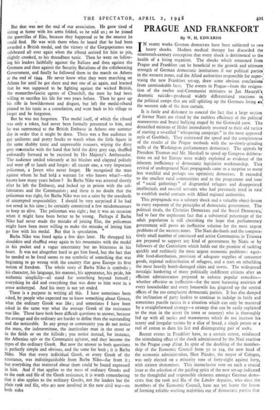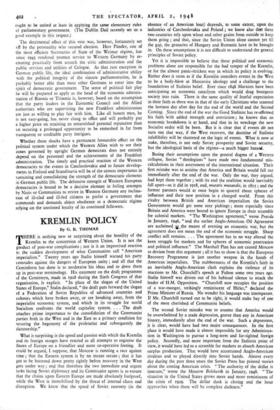PRAGUE AND FRANKFORT
By W. H. EDWARDS
IN recent weeks German democrats have been subjected to two heavy shocks. Modern medical therapy has discarded the nineteenth-century conception that every shock is detrimental to the health of a living organism. The shocks which emanated from Prague and Frankfort can be beneficial to the growth and ultimate strength of German democratic institutions if our political parties' in the western zones, and the Allied authorities responsible for super-: vismg the new Frankfort set-up, draw some obvious conclusions from unmistakable facts. The events in Prague—from the resigna- tion of the twelve anti-Communist ministers to Jan Masaryk's
dramatic suicide—produced widely differentiated reactions in the political camps that are still splitting up the Germans living the western side of the iron curtain.
It is futile and dishonest to conceal the fact that a large section of former Nazis are elated by the ruthless efficiency of the political' manoeuvres and brutal bullying staged by the Gottwald crew. The denazified minions of Hitler immediately resorted to their old tactics of starting a so-called " whispering campaign " in the most approved style of Goebbels. They contrasted the speed and the completeness' of the results of the Prague methods with the so-slowly-grinding mills of the Washington parliamentary democracy. The appeals by President Truman and Mr. Marshall to speed up Congress delibera- tions on aid for Europe were widely exploited as evidence of the inherent inefficiency of democratic legislative workmanship. This revival of underground Nazi propaganda came as a surprise to main: less watchful and perhaps too optimistic democrats. It extended, to the smallest rural communities and to the programme and tone of " social gatherings " of disgruntled refugees and disappointed intellectuals and ex-civil servants who had previously tried in vain', to establish useful contacts with Allied regional authorities.
This propaganda was a salutary shock and a valuable object-lesson to every exponent of the principles of democratic government. The political rivals, the Christian Democrats and the Social Democrats,' had to face the unpleasant fact that a substantial percentage of the adult population is still cherishing the hope that parliamentary government will prove an ineffective solution for the most urgent problems of the western zones. The Nazi die-hards and the compara.j Lively small number of convinced and active Communists in Trizonia are prepared to support any kind of government by Nazis or by followers of the Cominform which holds out the promise of tackling quickly and ruthlessly the most urgent economic problems: equit- able food-distribution, provision of adequate supplies of consumer goods, regional redistribution of refugees, and a start on rebuilding the most heavily bomb-damaged cities and towns. The widespread nostalgic hankering of many politically indifferent citizens after an efficient administration prepared to enforce popular remedies— whether effective or ineffective—for the most harassing anxieties of every householder and every housewife has gingered up the central offices of the too complacent democratic parties. It has also damped the inclination of party leaders to continue to indulge in futile and sometimes puerile tactics in a situation which can only be mastered by a straightforward strategy—a strategy that can be easily explained to the man in the street (in town or country) who is thoroughly fed up with all tactics and manoeuvres which do not increase his scanty and irregular rations by a slice of bread, a single potato or a reel of cotton to darn his last and disintegrating pair of socks.
Recent events in Frankfort have, to a certain extent, reinforced
the stimulating effect of the shock administered by the Nazi reaction to the Prague coup d'etat. In spite of the doubling of the member- ship of the Economic Council from 52 to 104, the new head of the economic administration, Herr Piinder, the mayor of Cologne, was only elected on a minority vote of forty-eight against forty, with sixteen abstentions. This inconclusive vote on such a crucial issue as the selection of the guiding spirit of the new set-up indicated to the thoughtful and responsible elements amongst German demo- crats that the rank and file of the Lander deputies, who elect the members of the Economic Council, have not yet learnt the lesson of forming reliable working majorities out of democratic parties that
ought to be united at least in applying the same elementary rules of parliamentary government. (The Dublin Dail recently set us a good example in this respect.) The detrimental effect of this vote was, however, fortunately set off by the personality who secured election. Herr Piinder, one of the most efficient Secretaries of State of the Weimar regime, has since 1945 rendered yeoman service to Western Germany by re- creating practically from scratch the civic administration and the public services and utilities of Cologne. As that rare exception in German public life, the ideal combination of administrative ability with the political integrity of the sincere parliamentarian, he is probably better able than most other Germans to enter into the spirit of democratic government. The sense of political fair play he will be prepared to apply as the head of the economic adminis- tration of Bizonia or Trizonia is, however, based on the assumption that the party leaders in the Economic Council and the Allied authorities who are supervising the new Frankfort administration are just as willing to play fair with him. Like all honest men, he is not easy-going, has never clung to office and will probably put a higher price on retaining an untarnished personal reputation than on securing a prolonged opportunity to be enmeshed in far from transparent or creditable party intrigues.
Whether these shocks have a permanent favourable effect on the political system under which the Western Allies wish to see their zones governed by upright German democrats does not entirely depend on the personnel and the achievements of the Frankfort administration. The timely and practical reaction of the Western democracies to the events in Czechoslovakia and to future develop- ments in Finland and Scandinavia will be of the utmost importance in sustaining and consolidating the strength of the democratic elements in German public Iffe. The defensive strength of Western European democracies is bound to be a decisive element in foiling attempts by Nazis or Communists to revive in Western Germany any inclina- tion of ill-clad and ill-fed citizens to prefer a government that commands and demands abject obedience to a democratic regime relying on the unstinted loyalty of its convinced followers.































 Previous page
Previous page